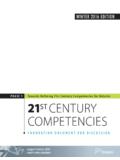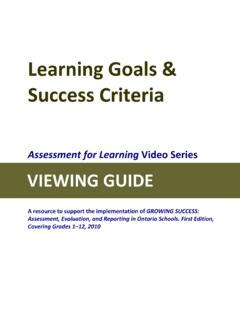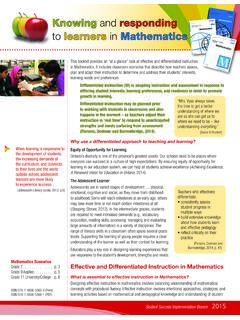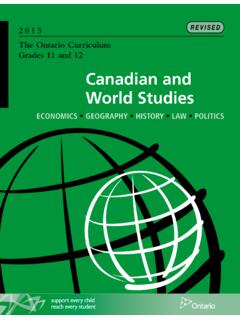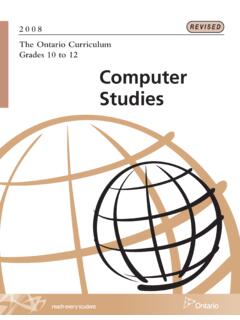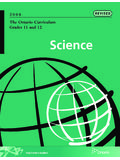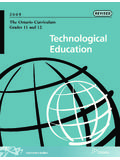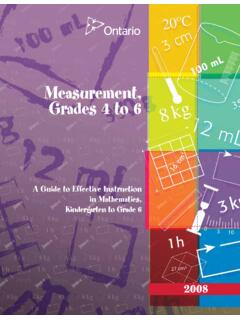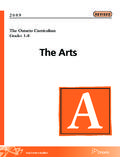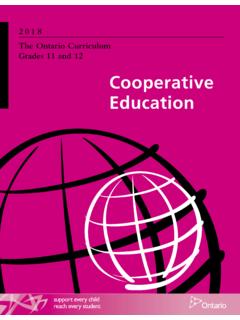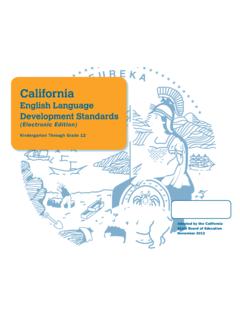Transcription of Reporting Student Learning: Guide for Effective Teacher ...
1 Reporting Student learning Guidelines for Effective Teacher -Parent- Student Communication 2 0 10. Contents ParT 1: The Importance of Effective Teacher -Parent- Student 2. Communication Introduction 2. Ongoing and Effective Communication 3. Equitable and Inclusive Communication 4. ParT 2: Elementary and Secondary Provincial report Cards 5. Comments Relating to the Achievement of Curriculum Expectations 5. Comments Relating to the Development of learning Skills and Work Habits 6. Criteria for Effective Report Card Comments 6. Examples of Report Card Comments 7. Strengths 8. Next Steps for Improvement 11. Special Considerations 13. students With Special Education Needs 13. English Language Learners 15. students Whose Achievement Is Below Level 1 15. Cases of Insufficient Evidence 15. The Importance of Planning for Writing Effective Report Card Comments 16.
2 References 17. Une publication quivalente est disponible en fran ais sour le titre suivant : La communication du rendement de l' l ve : Directives visant une communication efficace entre enseignante ou enseignant, parent et l ve. PA RT The Importance of Effective 1 Teacher -Parent- Student Communication Introduction Effective Teacher -parent- Student communication is fundamental to Student success. Reporting Student learning focuses on strategies and practices that teachers can use to establish Effective ongoing communication with students and their parents, particularly with respect to assessment and evaluation. One aspect of communication among teachers, parents, and students is the information teachers provide on report cards. Personalized, clear, precise, and meaningful report card comments are essential for informing students and their parents1 about what students have learned, their strengths as learners, and the next steps for improvement.
3 Yet, as the policy document Growing Success: Assessment, Evaluation, and Reporting in ontario Schools notes, Although there are three formal Reporting periods, communication with parents and students about Student achievement should be continuous throughout the year, by means such as parent- Teacher or parent- Student - Teacher conferences, portfolios of Student work, Student -led conferences, interviews, phone calls, checklists, and informal reports ( ontario Ministry of Education, 2010a, p. 53). Teachers are encouraged to develop a range of practices and strategies for Effective communication with parents and students . Reporting Student learning is a resource that educators can use to review and reflect on understandings and practices related to writing report card comments as 1. In this document, the term parents is used to refer to parents and legal guardians.
4 2. Part 1: The Importance of Effective Teacher -Parent- Student Communication 3. well as practices for providing ongoing feedback to parents and students and engaging them in ongoing dialogue, with the goal of improving Student learning . To engage both students and parents, all communications, learning opportunities, including report card comments: resources, and supports are should be in clear, meaningful language that students provided to help parents and parents can understand; support Student learning and have productive should provide essential information to parents and parent- Teacher - Student students to help students improve their learning . conversations.. ( ontario Ministry of Education, 2010b, p. 37). Ongoing and Effective Communication In classrooms across the province, teachers and students engage in a variety of assessment practices to help improve Student learning .
5 These practices include assessment for learning and assessment as learning , which involve, for example, sharing clear learning goals and success criteria, providing descriptive feedback, and providing opportunities for students to develop their skills of peer- and self-assessment. The Elementary Progress Report Card supports assessment for learning and assessment as learning . It also provides an opportunity to: 1. establish a positive relationship between teachers, parents, and students ;. 2. involve parents as partners in a conversation about learning and assessment, and what they can do to support their child's learning ;. 3. identify concerns about Student progress early in the school year and develop strategies to improve Student learning . In their comments on the Elementary Progress Report Card, teachers provide descriptive feedback that indicates to parents whether their children are on track and progressing In the case of students who are experiencing difficulties, the descriptive feedback acts as a red flag , indicating the need for additional supports or interventions.
6 Teachers also engage in assessment of learning (or evaluation) that is, gathering evidence and making judgements about how well students have achieved the curriculum expectations and developed the learning skills and work habits. They communicate those judgements to students and parents primarily through the Elementary and Secondary Provincial Report Cards. In addition 2. Where students are taught by more than one Teacher , teachers may choose to collaborate to write Effective comments. 4 Reporting Student learning to the letter grades or percentage marks teachers assign and record on the Provincial Report Cards to represent a summary of their judgements about the Student 's achievement, they give descriptive feedback in comments, indicating what students have learned and need to learn as well as providing guidance to help students improve their learning .
7 For some students experiencing significant academic or behavioural challenges, communication with parents and the development of supportive interventions may have to begin even earlier than the Elementary Progress Report Card. For example, the updating of Individual Education Plans (IEPs). and communication with parents as part of that process must be completed in the first weeks of the school year. Teachers and schools can share information with parents about assessment practices through newsletters, school websites, and parent information nights. Equitable and Inclusive Communication It is important to recognize that, in ontario 's diverse society, there may be challenges in communicating with some parents. Teachers may need to use interpreters, settlement workers, or other community support personnel to assist in communicating ontario is Canada's most information about Student progress and achievement.
8 For First diverse province We Nation, M tis, and Inuit students , teachers should consider must address the needs involving Aboriginal counsellors and/or members of the of a rapidly changing and extended family. increasingly complex society by ensuring that our policies evolve with changing societal needs.. ( ontario Ministry of Education, 2009, p. 9). P AR T Elementary and 2 Secondary Provincial Report Cards we must acknowledge that if parents do not understand the information in the report card, it's not their fault. As communicators, it is our responsibility to make sure that our message is clear and comprehensible to those for whom it is intended. This is the communication challenge involved in developing a standards-based report card.. (Guskey and Bailey, 2010, p. 122). The provincial report cards are designed for teachers to provide feedback in the form of comments on students ' Strengths and Next Steps for Improvement with respect to both their achievement of curriculum expectations and their development of learning skills and work habits.
9 The Elementary Provincial Report Card provides separate sections for comments on the develop- ment of learning skills and work habits and for comments on the achievement of curriculum expectations. The Secondary Provincial Report Card provides a single space for comments, in which the Teacher may include comments on the development of learning skills and work habits in addition to comments on the achievement of curriculum expectations. Although the guidelines provided in this chapter often apply equally to the writing of comments related to each of the two areas, the comments are normally separate, as is the evaluation of Student achievement of the curriculum expectations and the evaluation of the development of learning skills and work habits. Comments relating to the achievement of Curriculum Expectations On the provincial report cards, it is essential that the comment and the assigned letter grade /.
10 Percentage mark for a subject/course work together to convey a clear and consistent message about the Student 's achievement of the curriculum expectations. The grade /mark should reflect the Student 's most consistent level of achievement, with special consideration given to more recent evidence of achievement. The comment should provide clear, meaningful, and personalized reflections on the Student as a learner in the particular subject/course. 5. 6 Reporting Student learning Comments relating to the Development of learning Skills and Work Habits Growing Success emphasizes the importance of six learning skills and work habits responsibility, organization, independent work, collaboration, initiative, and self-regulation. Teachers report students ' development of these skills as excellent , good , satisfactory , or needs improvement.
